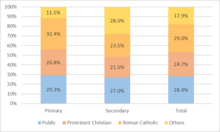Special school (Netherlands)
In the Dutch education system, particular education ("bijzonder onderwijs") refers to a separate category of education distinct from both public and private education, in which a school is administered by an independent board, as opposed to a government authority, while still receiving government funding.[2] Particular schools are comparable to the concept of a charter school, with the additional characteristic of being grounded in a particular religious denomination or educational philosophy.[2] Particular education is not to be confused with "speciaal onderwijs", which refers to schools specialized to deal with physical and/or learning disabilities.

Definition
Particular education schools teach on the basis of religion, philosophy of life or a vision of education. Public school lessons are not based on religion or belief. The government pays for both types of education. For this, schools must meet conditions. For example, education must be of sufficient quality. There are also requirements, for example, for the minimum number of pupils, the competence of teachers and the number of hours of education.[2]
Particular schools differ from both public and private schools in the way they are funded and run. While privately run, particular schools are not altogether outside the control of the Dutch Ministry of Education, as they are subsidized on equal footing with public schools, and cannot charge tuition over the statutory rate.[3] They are therefore also distinct from private schools—of which there are a small but increasing number in the country[4]—which get no subsidies and can charge market tuition.
Public schools
Public schools are open to every student and teacher. Education is not based on religion or belief. There are public schools that teach from certain educational principles. The municipality must ensure that there is enough public education. This is also stated in Article 23 of the Dutch Constitution on freedom of education. When there are not enough public schools in the area, then the municipality ensures that children receive public education in a different way. For example, by arranging transport to a public school.[2]
Particular schools
Special schools teach from a certain direction, which is a religious or philosophical belief. A special school is usually created, because parents need a school of a particular religious or pedagogical direction.
Subcategories
Particular education can be further subdivided into two categories:
- Denominational Particular Education ("confessioneel bijzonder onderwijs") refers to schools grounded in a religious denomination, often founded by or linked to church boards or religious foundations. Examples of denominational schools are Christian schools, including Roman Catholic, Evangelical, and Protestant Reformed, as well as Islamic, Jewish, and Hindu schools. Denominational schools represent the majority of particular schools.
- General Particular Education ("algemeen bijzonder onderwijs") refers to a minority of particular schools not rooted in religion but operating on a particular educational concept, such as Dalton education, Montessori education, Jenaplan education , and Waldorf education.[2][5]
In practice, classification is complicated by schools that combine aspects of denominational and general, as well as public and particular education, for instance schools that adhere to an educational philosophy while lacking an independent school board, and schools combining denominational and educational philosophy in their teaching.[5]
History
The distinction between particular and public education arose from the hugely influential school struggle, which dominated Dutch politics from the mid-19th century until the Pacification of 1917, when public and religious schools were granted equal rights to government funding under article 23 of the Dutch constitution.[6][7]
Criticism
Since the post-World War II decline of the pillarization of Dutch society along ideological lines, and the rapid secularization of Dutch society, government funding of particular schools has in recent years become a topic of debate once again, with several political parties calling for an amendment or revoking of article 23 of the constitution.[8]
In July 2015, Sander Dekker, the State Secretary for the Ministry of Education, Culture and Science, proposed to the parliament to change the law on two aspects:[9]
- Not to demand that new schools are representing an ideological direction, such as a religion. New schools could be based on an idea for good education, for instance ICT-based education, green schools, or other innovative concept, as long as sufficient interest exists for such a system.
- To introduce a more severe quality control. Freedom of education should not be a license for bad educational systems.
References
- "CBS Statline". opendata.cbs.nl (in Dutch). Retrieved 2020-07-31.
- Wetenschap, Ministerie van Onderwijs, Cultuur en. "Openbaar en bijzonder onderwijs - Vrijheid van onderwijs - Rijksoverheid.nl".
- Ministerie van Onderwijs, Cultuur en Wetenschap (2016-03-18). "Wat zijn de kosten voor de basisschool van mijn kind? - Rijksoverheid.nl" Check
|url=value (help). onderwerpen (in Dutch). Retrieved 2020-07-31. - "Particulier onderwijs groeit snel". Algemene Onderwijsbond. Retrieved 31 July 2020.
- http://www.rug.nl/education/scholierenacademie/scholieren/profielwerkstuk/alfasteunpunt/subjects/onderwerpen/godsdienst/scholen%5B%5D
- "Schoolstrijd in Nederland (1806-1917)".
- "NRC". Archived from the original on 2014-10-15. Retrieved 2014-06-05.
- "Laait de schoolstrijd opnieuw op?". 28 October 2011.
- "Het is maar wat je vrijheid van onderwijs noemt". Retrieved 2015-07-02.